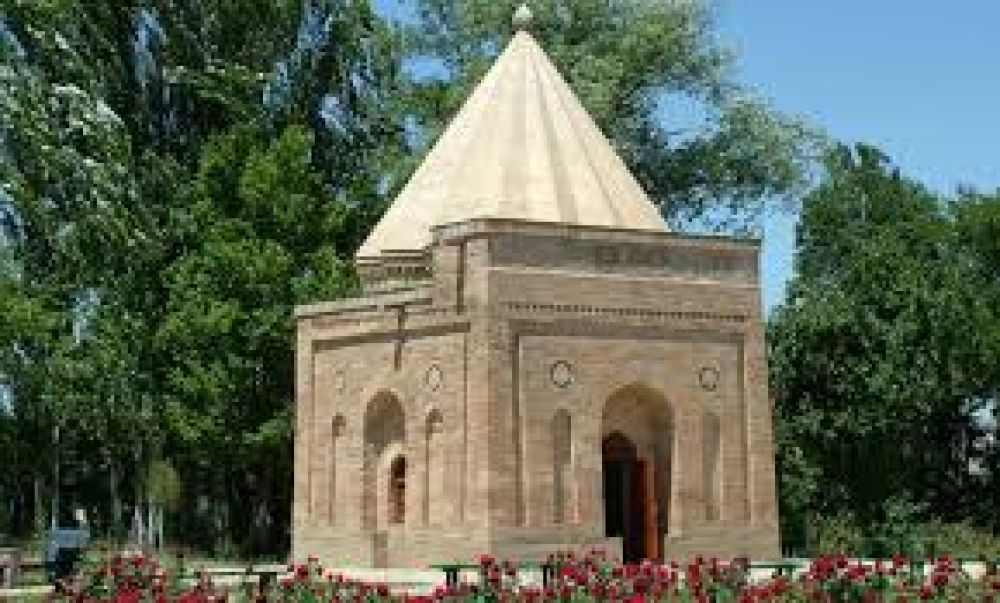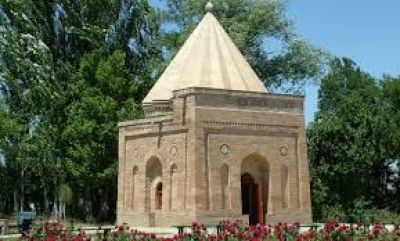

Discover the rich history of Babaji Khatun Mausoleum, one of Taraz's architectural gems, on a Guided Historical Tour. This activity offers a deep dive into the mausoleum’s past, showcasing its unique construction elements, such as the terracotta decorations and the distinct conical dome. Originally part of a complex, the mausoleum stands as a testament to the Karakhanid era. As you explore, you'll learn about Babaji Khatun, the prominent figure for whom the monument is named, along with insights into the religious and cultural significance of the site. The tour also sheds light on the Silk Road's influence on the region and the cross-cultural exchanges that shaped Taraz. Adept at storytelling, the guides bring to life tales of ancient traders and warriors who once frequented this historic crossroad.
Capture the essence of Babaji Khatun Mausoleum with a Photography Session, perfect for both amateur and professional photographers keen to photograph this historic site. The session includes a tour of the mausoleum grounds, where participants can take stunning shots of the intricate brickwork and the iconic dome silhouetted against the sky. Photography enthusiasts will relish the opportunity to snap pictures during different times of the day, as the changing light casts varying shadows and highlights the textures of the ancient structure. Participants will also receive tips on the best angles and settings to use for capturing the architectural features and surrounding landscapes. This is a self-guided activity, but hiring a local photographer or guide can provide additional insights and access to some of the less-known vantage points around the mausoleum.
Experience Kazakh culture firsthand with a Cultural Performance Viewing at Babaji Khatun Mausoleum. This activity often takes place during special events or festivals, which celebrate the nation's rich traditions. Audiences can enjoy performances of traditional Kazakh music and dance that provide a glimpse into the country's vibrant heritage. Performers dressed in colorful attire enchant spectators with the sounds of dombra (a traditional string instrument), energetic dances, and folk songs that have been passed down through generations. The backdrop of Babaji Khatun Mausoleum adds a layer of historical significance, creating an unforgettable atmosphere. Each performance tells a story that connects the audience with Kazakhstan's ancient past and its continuing cultural legacy.
Participate in Architectural Workshops at Babaji Khatun Mausoleum, tailored for both architecture enthusiasts and students. These educational sessions cover the Islamic architectural influences seen in the mausoleum, including the use of geometric designs and Kufic inscriptions. Workshop leaders, often experts in Central Asian architecture, explain the significance of the mausoleum's construction techniques and how they have been preserved through the centuries. Attendees also learn about the challenges of maintaining such a historical structure in modern times. Interactive components may include creating scale models or sketches of the mausoleum, allowing participants to apply the principles they've learned. The workshops aim to inspire appreciation for historical architecture and foster a deeper understanding of Taraz's cultural heritage.
Explore a different side of Babaji Khatun Mausoleum with a Sunset and Night Tour. As the sun dips below the horizon, visitors can experience the changing ambiance as the mausoleum and its surroundings are bathed in the warm glow of the setting sun. The tranquil atmosphere at dusk offers a moment of reflection, allowing visitors to contemplate the site's historical significance. Once night falls, the mausoleum is illuminated, showcasing its architectural beauty against the dark sky. These tours provide an intimate setting for storytelling, where guides share tales of the Silk Road under the stars. Night tours also offer the chance for visitors to observe the night sky, often with telescopes provided for stargazing sessions, adding an astronomical dimension to the historical experience.
